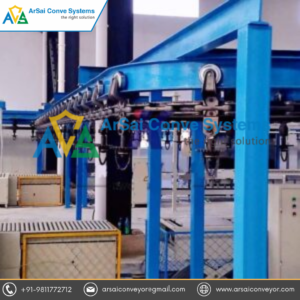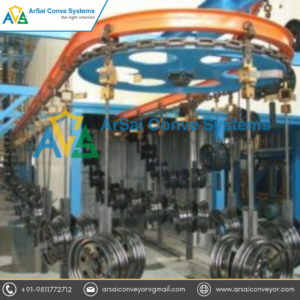I Beam Overhead Conveyor
I Beam Overhead Conveyor has brought increased efficiency to production lines. Using this proven design, ARSAI has developed the I-Beam conveyor with improved components for low-cost conveying in a wide range of applications. ARSAI overhead monorail conveyors are proven to provide the lowest “cost per lb. of capacity” of all overhead conveyors.
Specifications:-
Tracks & Turns: Tracks of l-Sections (3″ / 5″ / 6″) as per capacity requirement. Turns are provided with a guide roller or traction wheels to guide the chain.
CHAIN: Imported High carbon drop Forged rivet chain and trolleys available in 3″, 4″ & 6″ sizes.
With Load Bars; we can handle loads up to 2000 Kg.
Drive Unit: Sprocket type/caterpillar type is available, & it can used as per layout requirement. Multi drive units with speed synchronization can be used for longer conveyor loops.
Application:
- Heavy material Transfer
- Plastic , Steel parts, Painting Lines
- Assembly Lines
- Heavy Vehicle / Parts in Automobile industries
Our Products
FREQUENTLY ASKED QUESTION
An overhead conveyor is a type of conveyor system that is installed above the working area, typically in a manufacturing or industrial setting. It is used to move products, materials, or components from one point to another in a factory or warehouse, and is particularly useful for transporting heavy or bulky items that are difficult to move manually.
An overhead conveyor is a type of conveyor system that is installed above the working area, typically in a manufacturing or industrial setting. It is used to move products, materials, or components from one point to another in a factory or warehouse, and is particularly useful for transporting heavy or bulky items that are difficult to move manually.
Overhead conveyors are commonly used in a variety of applications, such as automotive assembly lines, food and beverage processing, material handling and distribution, and storage and retrieval systems. They can be used for both horizontal and vertical transportation and can move products along a fixed path or in a continuous loop.
Some specific uses of overhead conveyors include:
Assembly line transportation: Overhead conveyors are commonly used in manufacturing assembly lines to transport parts and components to different workstations along the line.
Powder coating: Overhead conveyors are used in powder coating operations to move products through a paint booth, where they are coated with a dry powder before being cured in an oven.
Overhead conveyors offer several advantages over other types of conveyor systems, including:
Space savings: Overhead conveyors allow you to make the most of your available space. Since they are mounted on the ceiling, they take up no floor space, allowing you to use your floor for other things.
Versatility: Overhead conveyors can be configured to move products in any direction, including up and down, as well as horizontally and diagonally. This makes them ideal for a wide variety of applications, from manufacturing and assembly to order picking and distribution.
Product protection: Overhead conveyors can be designed to handle delicate or fragile products without damaging them. This is particularly important in industries such as electronics or pharmaceuticals where product damage can result in significant losses.
Types of conveyors:
Belt Conveyors: These are the most commonly used type of conveyor, consisting of a continuous belt made of materials such as PVC, rubber, or nylon. Belt conveyors can be used to transport a wide variety of products, including food, bulk materials, and industrial goods.
Roller Conveyors: These are conveyor systems that use rollers to move products along the conveyor. They are commonly used for transporting items with flat or uneven bottoms, such as boxes, crates, and pallets.
Chain Conveyors: These use chains to move products along the conveyor. They are often used for heavy-duty applications, such as moving large or heavy items.
Screw Conveyors: These use a rotating screw to move products along the conveyor. They are often used for transporting bulk materials such as grain or cement.
Bucket Conveyors: These use a series of buckets attached to a chain or belt to transport materials. They are often used for handling bulk materials such as grains, sand, or fertilizer.
Overhead Conveyors: These use an overhead track to move products along the conveyor. They are often used in assembly lines and distribution centers, where floor space is limited.
I-Beam conveyors, also known as overhead or monorail conveyors, offer several benefits in industrial applications, including:
Space Saving: I-Beam conveyors are typically installed overhead, which frees up valuable floor space for other manufacturing operations.
Durability: I-Beam conveyors are made from high-quality steel, which makes them sturdy and able to handle heavy loads. They are built to last and require minimal maintenance, which reduces downtime and maintenance costs.
Versatility: I-Beam conveyors can be designed to accommodate a wide range of products, including heavy and bulky items. They can also be designed to operate in harsh environments, such as high temperatures or corrosive conditions.
Safety: I-Beam conveyors are designed to operate at a safe distance from the floor, which reduces the risk of accidents and injuries. Additionally, they can be equipped with safety features such as emergency stop buttons and sensors to prevent collisions.
Efficiency: I-Beam conveyors can be designed to move products quickly and efficiently, which reduces production time and labor costs. They can also be customized to meet specific production needs, such as sorting, assembly, and distribution.
Cleanliness: I-Beam conveyors can be designed to operate in clean room environments, making them ideal for applications such as food processing or pharmaceuticals where hygiene is critical.
Overall, I-Beam conveyors are a versatile and efficient solution for a wide range of manufacturing and material handling applications. They can help businesses improve productivity, reduce costs, and enhance workplace safety.

